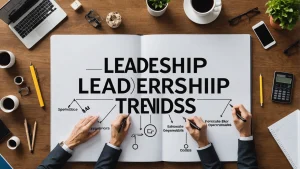
Personal growth is critical for effective leadership, as it enables individuals to evolve and adapt in today’s dynamic world. By focusing on self-improvement, leaders can develop the necessary skills to inspire and guide their teams to success. In this article, we explore five personal growth tips that can help you become a better leader. These tips include embracing a growth mindset, engaging in continuous learning, practicing self-reflection, building strong relationships, and prioritizing feedback.
Embrace a Growth Mindset
The first step to becoming a better leader is to embrace a growth mindset. A growth mindset is built on the conviction that abilities can be developed and expanded with effort, strategy, and help from others. This mindset is essential for effective leadership as it influences behaviors, decisions, and interactions, contributing to overall performance and achievement.
Understanding the difference between a fixed mindset and a growth mindset is crucial for personal growth. A fixed mindset views intelligence, character, and creativity as innate and unchangeable traits, often leading to a fear of failure, a constant need to prove oneself, and an aversion to risk. On the other hand, a growth mindset celebrates failure as a stepping stone to success and promotes resilience, allowing leaders to learn from their mistakes and continuously improve.
How to Develop a Growth Mindset
Developing a growth mindset involves taking proactive steps to challenge outdated beliefs and seek help from others. Here are three key strategies:
- Challenging outdated beliefs: Recognize that intelligence and personal qualities can always be changed and improved. Embrace the power of “yet” by shifting your perspective on failure from a dead-end to a stepping stone.
- Seeking help and mentorship: Reach out to experienced leaders or experts in your field for guidance and support. By learning from others, you can expand your skillset and knowledge, ultimately becoming a more effective leader.
- Celebrating failures as learning opportunities: Instead of avoiding failure, view it as a chance to grow and learn. Reflect on your mistakes and identify areas for improvement, fostering a mindset of continuous growth and development.
Real-World Examples of Leaders with a Growth Mindset
Examples of successful individuals who have embraced a growth mindset include Serena Williams, Michael Jordan, and companies like Microsoft and Pixar. These leaders and organizations demonstrate the power of embracing challenges, learning from mistakes, and fostering a culture of continuous improvement. By adopting a growth mindset, you too can unlock your leadership potential and inspire your team to achieve greater success.
Continuous Learning and Skill Development
The importance of continuous learning for leaders cannot be overstated. By constantly updating their knowledge and skills, leaders can stay informed about the latest industry trends and best practices, enabling them to make better decisions and lead their teams more effectively. In this competitive world, leaders who prioritize learning are better equipped to adapt to new challenges and stay ahead of the curve.
The Importance of Continuous Learning for Leaders
Continuous learning not only helps leaders stay informed but also fosters personal growth, which is crucial for effective leadership. By embracing a lifelong learning mindset, leaders can set an example for their teams, demonstrating commitment to constant improvement and growth. This can inspire and motivate team members to follow suit, creating a culture of learning and development within the organization.
Strategies for Expanding Skillset and Knowledge
There are several approaches leaders can take to expand their skillset and knowledge. Here are some strategies for continuous learning:
- 1. Reading books: Books can provide valuable insights and perspectives on a wide range of topics, including leadership, management, and industry-specific subjects. Regularly reading books can help leaders expand their knowledge and stay informed about new ideas and best practices.
- 2. Attending workshops and seminars: Workshops and seminars offer opportunities to learn from experts and peers, gain hands-on experience, and network with other professionals. Leaders can benefit from attending these events to stay updated on the latest trends, techniques, and tools in their field.
- 3. Taking online courses: Online courses provide a flexible and convenient way for leaders to learn new skills and concepts at their own pace. Many reputable platforms offer courses on a wide range of subjects, including leadership development, management, and industry-specific topics.
- 4. Seeking mentorship: Mentorship can be a valuable tool for leaders looking to grow and develop their skills. By connecting with experienced professionals, leaders can gain valuable insights, advice, and guidance to help them navigate their career and enhance their leadership abilities.
Staying Updated with Industry Trends and Best Practices
Staying informed about the latest trends and best practices in their industry is essential for leaders to make informed decisions and lead their teams effectively. By regularly reading industry-specific journals, blogs, and news articles, leaders can stay up-to-date on new developments and innovations. In addition, participating in professional associations, attending conferences, and joining industry-specific online forums can help leaders stay connected with their peers and gain insights into the latest best practices.
Self-Reflection and Goal Setting
Self-reflection plays a crucial role in leadership development by allowing leaders to identify their strengths and weaknesses, ultimately gaining self-awareness. This process of introspection helps leaders understand their own abilities and areas for improvement, making it easier to grow and adapt their leadership style.
The Role of Self-Reflection in Leadership Development
Through self-reflection, leaders can identify their strengths and weaknesses, which is vital for personal growth. By understanding their own capabilities and areas for improvement, leaders can focus on enhancing their skills and overcoming challenges. Gaining self-awareness helps leaders better understand their own thoughts, emotions, and actions, making it easier to communicate and connect with their team members.
Techniques for Effective Self-Reflection
There are several techniques leaders can use for effective self-reflection:
- Journaling: Writing down thoughts and experiences can help leaders gain insight into their own actions and emotions, revealing patterns and areas for improvement.
- Seeking feedback: Actively seeking feedback from team members, colleagues, and mentors can provide valuable insights into a leader’s performance and areas for growth.
- Introspective exercises: Engaging in introspective exercises such as meditation, mindfulness, or visualization can help leaders better understand their own thoughts and emotions, leading to greater self-awareness and personal growth.
Setting SMART Goals for Personal and Team Growth
Leaders should set SMART (Specific, Measurable, Attainable, Relevant, and Time-bound) goals for themselves and their teams. By setting clear and achievable goals, leaders provide direction and purpose, which can motivate and inspire their team members. Regularly reviewing progress towards these goals and making necessary adjustments ensures success and demonstrates the leader’s commitment to personal growth.
Building Strong Relationships
One of the most important aspects of effective leadership is the ability to build strong relationships with team members. Positive relationships create a supportive and collaborative work environment, where individuals feel valued and motivated to contribute their best efforts. By fostering strong connections, leaders can improve team performance and overall productivity.
Strategies for Fostering Strong Connections with Team Members
There are several strategies that leaders can implement to foster strong connections with their team members. These include:
- Active listening: Leaders should make a conscious effort to listen to their team members and truly understand their thoughts and concerns. This involves giving undivided attention, asking follow-up questions, and summarizing key points to ensure clear understanding.
- Empathy and understanding: By putting themselves in the shoes of their team members, leaders can better understand their needs, emotions, and perspectives. This empathy enables leaders to address issues effectively and provide appropriate support and guidance.
- Effective communication: Clear and open communication is critical for building strong relationships. Leaders should be transparent in sharing information, providing feedback, and addressing concerns. This helps to establish trust and fosters a positive work environment.
Investing in Getting to Know Team Members on a Personal Level
Beyond the professional realm, leaders should also invest time and effort in getting to know their team members on a personal level. This includes understanding their individual strengths, aspirations, and challenges. By showing genuine interest in their team members’ lives, leaders can create a strong bond and enhance their ability to lead effectively.
By building strong relationships with their team members, leaders can create a positive and productive work environment that fosters success. This not only enhances team performance but also promotes personal growth for leaders as they continuously learn from their team members and adapt their leadership style accordingly.
Prioritize and Seek Feedback
One of the key personal growth tips for becoming a better leader is to prioritize and actively seek feedback. Feedback plays a crucial role in both personal growth and leadership development. It provides valuable insights into areas where leaders can improve and grow, ultimately enhancing their leadership skills and creating a positive work environment .
The value of feedback for personal growth and leadership development
Feedback, when given constructively, can be an essential tool for identifying blind spots, addressing weaknesses, and making necessary changes in leadership approach. Leaders who are open to feedback demonstrate a commitment to continuous improvement and a willingness to learn from their mistakes. This not only helps them grow as leaders but also sets a positive example for their team members to follow.
Creating a culture of open communication and honest feedback
In order to benefit from feedback, leaders must create a culture of open communication where team members and colleagues feel comfortable sharing their thoughts and opinions. This can be achieved by fostering an environment of trust and respect, ensuring that feedback is given and received in a constructive manner, and actively encouraging team members to voice their concerns and suggestions. By creating a feedback-friendly atmosphere, leaders can facilitate a more collaborative and supportive work environment.
Listening to feedback and making necessary changes to improve leadership skills
Receiving feedback is only the first step in the personal growth journey. Leaders must also be willing to listen to the feedback, reflect on it, and take appropriate action to address the areas of improvement. This may involve making changes in leadership style, communication approach, or decision-making processes. By actively listening and responding to feedback, leaders can continually refine their skills and adapt to the ever-evolving demands of their role, ultimately becoming more effective and successful leaders.
Unlock Your Leadership Potential
In this article, we’ve explored 5 personal growth tips for becoming a better leader: embracing a growth mindset, continuous learning and skill development, self-reflection and goal setting, building strong relationships, and prioritizing feedback. Implementing these tips can significantly improve leadership skills and foster a positive work environment .






